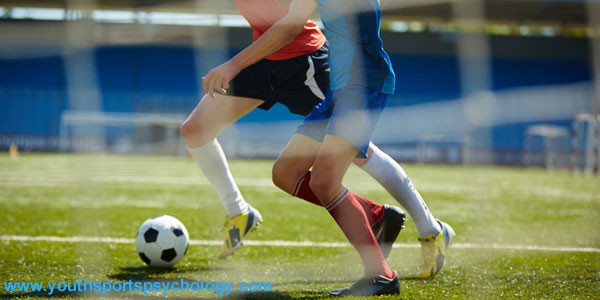Teach Sports Kids To Focus on What They Can Control
Do your sports kids worry too much before and during competitions?
When they worry, they’re often trying to control issues related to performance that are outside of their direct control.
These issues include getting injured, being benched by a coach, playing against a higher ranked opponent and competing in poor weather conditions.
For example, when kids focus on how well an opponent is playing (which is outside of their control), it can spark anxiety and take the focus off of what kids should be concentrating on–themselves and their game.
Kids need to learn this important lesson: They should focus on controlling what’s controllable.
This may seem like a minor issue. But it’s important; controlling the controllables gives kids a sense that they have an impact on their destiny and that their performance is not dictated by outside forces.
Remind young athletes that they can’t control how many minutes their coach plays them in a game. But they can control their effort and focus during practice. They can control their attitude.
Even when kids are suffering from an injury, they’re still in control of their attitude, their ability to relax and their overall perspective.
Here’s an example: The status of the 2021 Tokyo Olympics is uncertain due to the pandemic. But athletes can embrace a “control the controllables” mindset.
Nicole Forrester, a 2008 Olympic Canadian high jumper and mental performance coach, has helped prepare Canadian athletes for the 2021 Tokyo Olympic Games. In this effort, she emphasizes the importance of controlling the controllables and letting everything else go.
“What can’t you control? You can’t control the virus, you can’t control access to a facility, and you can’t control whether the Olympics is a certainty or not, but you treat it as if it is. But you can control your nutrition; you can control your sleep,” she said.
It’s empowering for sports kids to stay focused on the issues they can control.
Focusing on the controllables gives meaning to all the hours kids spent training, the sacrifices they made as athletes and the dedication of pushing themselves to achieve their goals.
One tip for controlling the controllables: Kids should recognize when they’re blinded by their circumstances and then take action to shift their perspective. To do this, they can write down as many variables of performance that are under their control. It doesn’t matter how small or insignificant they may seem.
For example, sports kids can control their thinking, how they react to challenges, their preparation and their nutrition.
They can’t control the weather conditions, the field conditions, officials, judges or their opponents.
Help kids stop focusing on things they can’t control. Help them recognize when this is happening, and refocus their thoughts. This will allow them to feel empowered. It will also boost their confidence and success in sports.
Related Articles on Kids’ Mental Game:
- How to Set Standards of Excellence for Young Athletes
- How to Resolve Conflicts in Youth Sports
- What Can Athletes Learn from Elite Athletes’ Mindset?
*Subscribe to The Sports Psychology Podcast on iTunes
*Subscribe to The Sports Psychology Podcast on Spotify
Improve Your Mental Game From Anywhere In The World

We’re certain that, as a parent, you want to help your child develop confidence and discipline in sports and life. And as a sports parent, you’d love for your children to reach their potential in sports. But encouraging your child to strive for greatness without pressuring them can be a challenge.
You can get expert mental coaching with us from anywhere. Meet with us via Zoom, Skype, FaceTime or phone call. With today’s video technology, we are able to connect with athletes and coaches all over the globe.
Call Us Today to Schedule Your Free 15-Minute Session.
Find Out How Your Athlete Can Benefit From One-on-One Mental Coaching!

